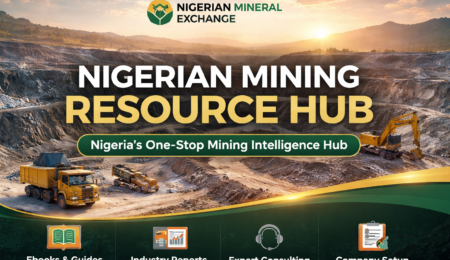When most people think of Nigeria’s mineral wealth, their minds go to high-value exports like gold and lithium. But the real, day-to-day workhorse of the Nigerian economy lies in a far more fundamental sector: quarrying. With a nationwide boom in construction and infrastructure, quarry businesses are proving to be a stable, high-demand, and highly profitable venture.
This guide goes beyond the surface to reveal the true potential of Nigeria’s quarry industry. It’s a comprehensive look at the key drivers of the boom, the specific materials driving the market, and the legal and financial roadmap to owning a successful quarry business.
1. The Reason for the Boom: Infrastructure and Construction
The boom in Nigeria’s quarry sector is fueled by three core, non-negotiable demands:
- Massive Urbanization: Nigeria’s population is growing at an incredible rate, creating an insatiable demand for residential and commercial real estate. Every building, from a small house to a high-rise office block, needs quarry products like granite, sand, and laterite.
- Government Infrastructure Initiatives: The federal and state governments have a renewed focus on road construction, bridges, and public infrastructure. These projects require a massive, consistent supply of aggregates, creating a high-volume market for quarries.
- The Supply Gap: Despite the demand, supply is often not enough due to logistical challenges and a lack of formalized, large-scale operations. This creates a powerful opportunity for new entrants who can provide a consistent supply of quality materials.
2. Where to Find the Materials: A Geographic Guide to Key Resources
The most lucrative quarry businesses are built on a foundation of readily available, high-demand resources.
- Granite: The workhorse of the construction industry. Granite deposits are abundant, particularly in the rock belts of the south and central regions. Key locations include Abuja, Nasarawa, Ogun, Plateau, and Ekiti.
- Limestone: The single most important raw material for cement production. Nigeria’s limestone deposits are vast, with some of the largest found in Ogun, Sokoto, and Benue. The Obajana Cement Plant in Kogi State, for example, is a testament to the immense commercial viability of this resource.
- Laterite: A fundamental material for road construction and building blocks, found in abundance across the country.
- Sand & Gravel: Essential for concrete and other construction materials, found in riverbeds and other sedimentary formations.
3. The Legal Path to Owning a Quarry: The Quarry Lease (QL)
To operate a quarry legally, you must secure a Quarry Lease (QL) from the Nigerian Mining Cadastre Office (MCO). The QL gives you the exclusive right to mine specific rocks or aggregates within a designated area.
- Key Requirements:
- You must be a company incorporated with the CAC.
- You must submit a detailed Pre-Feasibility Report, signed and sealed by a member of the Council of Mining Engineers and Geoscientists (COMEG).
- You must provide an irrevocable consent letter from the landowners of the site.
- Key Provisions:
- Duration: A QL is granted for a period not exceeding five years and is renewable.
- Area: The maximum area for a QL is 5 square kilometers.
- The Profitability: While the upfront cost is significant-with some projects requiring over ₦450 million in initial capital, the profitability is immense. Case studies of successful quarries in Nigeria show profit margins exceeding 200% and multi-million Naira monthly revenues.
If you are a serious investor who wants to move quickly and avoid the risks of the informal market, our Mining & Mineral Trading Company Setup (Nigeria) service is a done-for-you solution that handles every aspect of your legal and regulatory setup, from company registration to securing your Quarry Lease.
4. Revenue Streams & The Nigerian Mineral Exchange
The quarry business is not a one-trick pony. The most profitable quarries have multiple revenue streams:
- Sale of Products: Selling aggregates, sand, and crushed stone to construction companies and builders.
- Contract Crushing: Offering your quarrying and crushing services to other companies.
- Sale of By-products: Selling smaller-grade crushed stones or overburden materials for secondary uses.
Once your business is legally established and your products are ready, the Nigerian Mineral Exchange provides a platform for you to connect with verified buyers, ensuring your products get to market efficiently and at a fair price.
Our ebook, A Comprehensive Guide to Entrepreneurship in Nigeria’s Lucrative Mining Industry, provides a complete roadmap to building a business in this sector, from market research to a detailed financial model.
📘 The Nigeria Mineral Trading & Licensing Blueprint (2026 Edition)
If you are serious about buying, selling, or trading minerals legally in Nigeria, you cannot afford to rely on guesswork, outdated advice, or hearsay. The regulatory environment is tightening fast, and costly mistakes now lead to permit denials, seizures, or permanent blacklisting.
That’s why we created The Nigeria Mineral Trading & Licensing Blueprint: 2026 Guide to Buying Center Licenses & Purchase Permits — an updated, clear, step-by-step, insider guide that shows you exactly how to obtain Mineral Buying Center Certificates, Purchase & Possession Permits, and related approvals without delays or regulatory traps.
This guide distills real regulatory procedures for 2026, compliance requirements, and practical insights used by serious operators — saving you months of confusion, wasted money, and avoidable risk.
If mineral trading is part of your business future, this blueprint is not optional — it’s protection.
READ ALSO:





Leave a Reply